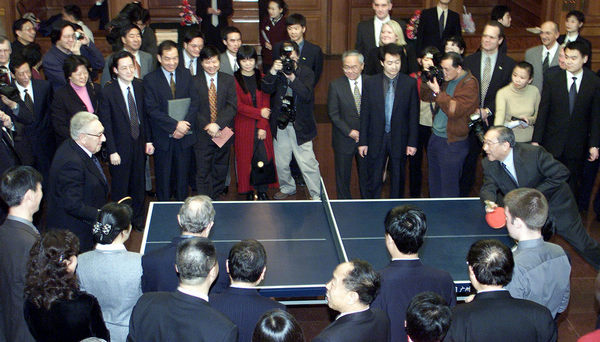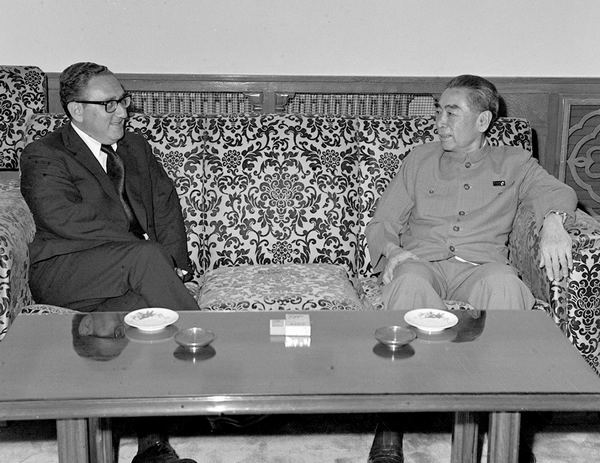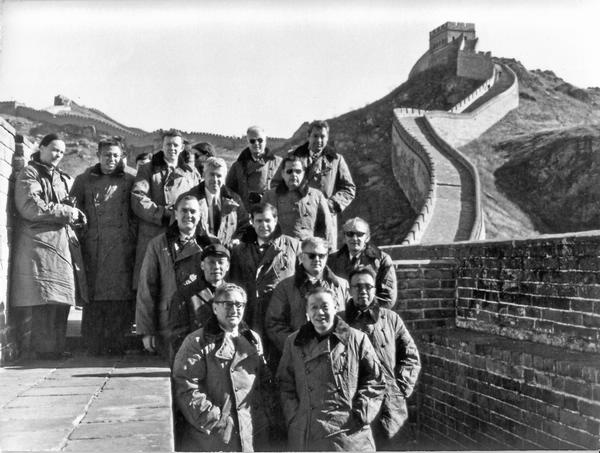Foreign and Military Affairs
Unraveling mysteries behind Nixon's 1972 China visit
By Li Xing (China Daily)
Updated: 2011-06-24 08:34
 |
Large Medium Small |
|
|
Ping-pong diplomacy
Although Nixon was interested in using back channels, he also sent messages via the news media. The most explicit was Time magazine's interview with Nixon published in October 1970, in which Nixon said if he couldn't go to China, he hoped his children would be able to go.
On Dec 10, 1970, Mao extended his direct invitation to Nixon during his five-hour talk with Edgar Snow, the American journalist known for his Red Star Over China and other more sympathetic reportage of New China.
As Snow wrote in "A Conversation With Mao Tse-Tung," published in the April 30, 1971, issue of Life magazine, Mao said he welcomed rightists such as Nixon to visit China because the problems between China and the US would "have to be solved with Nixon".
Some Chinese writers suggested that Snow's article came out a bit late and was overshadowed by the more exciting features of the American table-tennis team's visit to China. But in his memoir Crossing the Divide - an Insider's Account of the Normalization of US-China Relations, John H. Holdridge, who was then busy preparing documents for Kissinger's possible secret visit to Beijing, wrote that he spent time "reading and rereading Edgar Snow's Life magazine account of his session with Chairman Mao. . . . In a way, Snow's encouraging account became our road map for the future."
In mid-April 1971, the world watched the drama of ping-pong diplomacy unfold.
According to Xiong, it was Mao who decided to invite the American table-tennis team to visit China as the team was about to return home from Nagoya, Japan. "Mao's decision not only opened up the door for China-US people-to-people friendship but also led to the strategic change in international relations," Xiong wrote.
And it was Zhou who attended to every detail of the team's tour.
As a result, it became "an inspired and theatrical piece of diplomacy that had all the attributes of Zhou Enlai's sophistication, wisdom and sense of tactical and strategic planning," Holdridge wrote in his memoir. He added that Zhou saw to it that "China, not the United States, would be regarded as the initiator of improved relations".
|
|
Back-channel details
Many tales discussed how both sides explored new channels in Paris, Islamabad and Bucharest, for instance.
Browsing through more than 250 pages of declassified American documents from the National Security Archive titled "the Beijing-Washington back-channel and Henry Kissinger's secret trip to China", one can clearly see how messages were passed between the Chinese and American leaders, not only via their own emissaries but also through heads of state of other countries, including Pakistan President Yahya Khan and Romanian President Nicolae Ceausescu.
Khan delivered Nixon's message, which he received during their talks in October 1970, to Mao and Zhou in November, and returned their message to the White House later that month via Pakistan's ambassador to the US. As Kissinger recalled in his book White House Years, this was the first message from China that had come "from a Head, through a Head, to a Head."
Many recounts were peppered with small details of light moments, such as how General Vernon A. Walters, then US military attache to France, was asked to go as far as "crashing the gate" to establish contacts with Chinese Ambassador Huang Zhen.
Chinese diplomats participating in the Zhou-Kissinger meetings mentioned the almost 2-inch-thick references Kissinger brought with him, in contrast to Zhou's talks from memory. Two American Secret Service agents had to carry what they called "the book" everywhere, even during their tour of the Forbidden City on the morning of July 10, 1971.
Zhang Ying was the wife of Zhang Wenjin, who was in charge of the Foreign Ministry's Western European, American and Oceania Affairs Bureau. While her husband led the small team of Chinese officials accompanying Kissinger's team on their flight from Rawalpindi to Beijing, she was taking care of the American team's accommodations and other protocols at Diaoyutai, the State guesthouse.
She recalled that they placed cigarettes, tea and candies in their rooms. "On the first day, no one touched anything; but the second day, we discovered that there were fewer cigarettes and candies," she wrote in her memoir. And the Chinese added more cigarettes, tea and candies.
"Nothing was left when they left," Zhang recalled.
Years later, Zhang met with Bette Bao Lord, whose husband, Winston Lord, traveled with Kissinger on the mission. She told Zhang that she distributed among her friends the candies that Lord had brought back from Beijing, Zhang recalled.
|
|
'New necessities'
Forty years on, Kissinger has shuttled across the Pacific more than 50 times.
He said at the Asia Society event that in his book he was trying to explain "why that relationship is so crucial for peace and progress in the world and how both sides . . . have to adjust their traditional thinking, or their historic thinking, to the new necessities".
He suggested that the relations between China and the United States must evolve "from crisis management to a sense of community" to deal with what he termed "an international situation for which there is no precedent in history".
"If they don't, every issue in the world will become an issue between great powers, and the danger of matters getting out of control and the loss of the possibility for creative joint efforts would be a tragedy," he said.
The Chinese hope that readers take his following messages to heart. In his introductory speech at the Asia Society event, Zhang Yesui, Chinese ambassador to the US, highlighted one of Kissinger's views that "echoes with the same from ancient Chinese philosopher Confucius, who said: 'A gentleman aims at harmony, not uniformity.'
"It is important for China and the US to recognize, understand and respect the differences and carefully manage bilateral relations, which is of increasing importance not only to both countries but also to the world at large," Zhang said.
"Just as he writes in his book, relations between China and the US need not and should not become a zero-sum game," Zhang said. "What needs to be dealt with is to move from crisis management to a definition of common goals."


